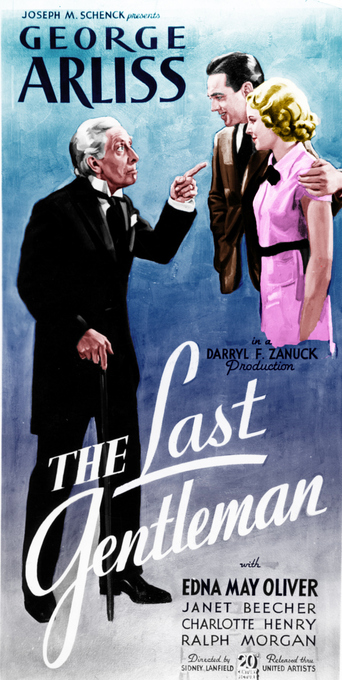



If you don't like this, we can't be friends.
Fantastic!
After playing with our expectations, this turns out to be a very different sort of film.
View MoreAll of these films share one commonality, that being a kind of emotional center that humanizes a cast of monsters.
View MoreLovely family drama of old man gathering estranged family about him to find out who loves him and who does not. Arliss as always a gem, especially in the last half of the film. There is a clever device of a talking film of him delivering his will at his memorial. First half played for broad comedy. A Fox film before being merged with 20th Century. Print quite out of focus and fuzzy. Interesting to see Rafaela Ottiano and Donald Meek, usually in supporting roles, here in leading roles and doing quite well.There is a need for IMDb to have a certain number of lines, but really, there is nothing more that I can say, so I hope this added sentence will suffice.
View More"I'll die when I like, and not before", says Edna May Oliver as one of the last of the oldest generation of the wealthy Barr family, much younger than her oldest brother (George Arliss) who has brought everybody together from the family on the pretension that one of the family, a missionary over in Africa, has died. In reality, he's obviously testing them to see who is worthy of his remaining estate, and it isn't his own children or their money-grubbing spouses. Placing two of the biggest scene-stealers (Arliss and Oliver) together in one film isn't going to leave much room for the other actors to capture attention, although they do try their very best. Janet Beecher, as Arliss's daughter and Donald Meek, as his son, are obviously on a mission to make sure they get the estate even though Arliss doesn't really like them. Olivier, too, doesn't quite seem on the up and up, giving her nephew Meek asides of utter hatred.Practically perfect in every way, this has little details throughout the film that are metaphors for both the family's greed and their idiocy, whether it be cuckoo clocks going off out of nowhere or high-pitched caterwauling of some of the younger female characters. The aging Arliss has a few surprises up his sleeve and delivers each line as if it was Noel Coward on opening night. Frank Albertson is impish and impulsive as Oliver's adopted son who ends up romancing his own cousin. Rafaela Ottiano's prickly sister-in-law is obvious yet funny, while Edward Ellis as a butler with a past offers dignity and pride. This is a comedy/drama about spending one's last days as if you will never die and certainly not leaving this world without a fight.
View MoreThe reputation of George Arliss, the third actor to win the Best Actor Oscar for DISRAELI, has been unfairly buffeted because of the series of biographical films he made in the early days of talkies. These are dismissed as nonsensical or slapdash or formulaic. Actually while a trifle old fashioned, Arliss's performances are always excellent, and several of the films (CARDINAL RICHELIEU and THE HOUSE OF ROTHSCHILD) have merits of their own. But the proof of Arliss's ability as an actor is in the non-biographical films. This one, THE LAST GENTLEMAN, is a good film to start with.Cabot Barr is the last New England aristocrat (as witness his first name). Living on a large estate, he is deeply disgruntled because of his son and heir, Judd Barr (Donald Meek). Meek is a spendthrift gambler, and is seeking to get an advance on his inheritance or to get control of the estate. Barr loves the past, a slower more traditional and staid period. He keeps having the family butler (Edward Ellis) start and restart the old tune, "Put On Your Old Gray Bonnet" on his Victrola. He has peacocks strolling on his lawn. Barr keeps looking for someone among his family to turn to who can be a better heir than the disgusting Judd. But it has to be somebody who can pass on the family name he is proud of.As in all of his films, the crusty, intelligent Arliss has a sense of humor. He plays and replays the song because he knows it annoys a lot of people (like his sister, played by Edna Mae Oliver). The high point of the film is when a psychiatrist arrives, brought in by Judd to declare the old man incompetent. Arliss confronts the psychiatrist, and skillfully proves he is totally in control of his mind and his senses. The psychiatrist agrees, and leaves (glaring at Judd). Judd tries to paper over this really dreadful action, but Arliss, quietly and effectively tells him to leave, and never see him again. In some ways it may have been George Arliss's most effective moment on screen - or at least among them.The conclusion of the film is pretty well summarized in the plot synopsis on this thread. The filmed will is a nice surprise, as is the way Arliss cleverly leaves the land of the living by passing out of a side door at the end of the will. But best is his treatment of Judd, to whom he decides to leave the peacocks.
View MoreThis is one of the best movies I have ever seen ! I know of no one else who has ever seen it, unfortunately, because it is rarely shown on TV. It is simply hilarious .The subject is timeless; the acting is wonderful; and the story line is delightful. Do not miss this one if you are ever so lucky as to find it.
View More